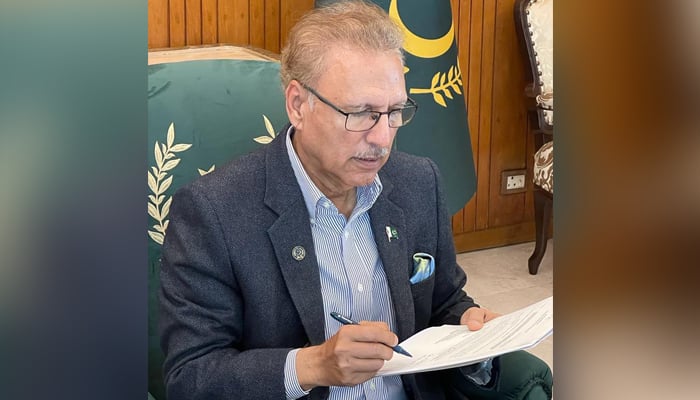- ECP ready to fulfil constitutional obligations, ECP says.
- Election commission now awaits KP governor’s response.
- PTI says ECP’s move a “step in the right direction”.
ISLAMABAD: President Arif Alvi has announced April 30 as the date for the general polls in Punjab, hours after the Election Commission of Pakistan (ECP) proposed dates for the election in the province as directed by the Supreme Court (SC).
“President Dr. Arif Alvi has announced the date of 30th April 2023 (Sunday) for holding the general elections of the Provincial Assembly of Punjab,” tweeted the President’s office on Friday.
Dr Alvi’s office said that the decision was made by the president after “considering the dates proposed by the Election Commission of Pakistan”.
Earlier today, the ECP — in a letter to President Alvi — had recommended that the polls for the provincial assembly in Punjab be held between April 30 and May 07.
The election commission met today — the third consecutive meeting — with Chief Election Commissioner (CEC) Sikandar Sultan Raja in the chair.
“The commission is ready to fulfil its constitutional and legal obligations after the selection of a date by the president,” the letter stated.
However, in a letter to Governor Khyber Pakhtunkhwa Ghulam Ali, the commission said it was waiting for his response in light of the SC order.
The Punjab and KP assemblies were dissolved on January 14 and January 18 respectively, and under the law, elections were to be held within 90 days after their dissolution.
However, after the governors’ refusal to fix a date for polls, the issue landed in the Supreme Court which directed the president to announce the election date in consultation with the commission.
It also ordered the KP governor to give an election date.
‘Step in the right direction’
Meanwhile, Pakistan Tehreek-e-Insaf welcomed the development and appreciated the ECP for taking a “step in the right direction”.
In a video statement, senior PTI leader Fawad Chaudhry said, “The Supreme Court, in its order, had allowed the president and the ECP to go beyond the 90-day time limit, but had used the word ‘bare minimum’, implying that the extension should be as small as possible.”
“We think that the ECP has taken a step in the right direction and the president now will announce a date for polls.”
Congratulating the nation over the development, Fawad said it is a victory for PTI, the nation, and the Constitution of Pakistan.
Supreme Court order
The apex court had noted in its verdict on March 1 that in “ordinary circumstances” the polls should have been held on April 9 as announced by the president.
“However, we are informed that on account of the delay in the emergence of the date for the holding of the general election, it may not be possible to meet the 90-day deadline stipulated by the Constitution.
“It is also the case that (possibly on account of a misunderstanding of the law) the Election Commission did not make itself available for consultation as required under Section 57(1) of the 2017 Act,” read the court order.
“The Election Commission is therefore directed to use its utmost efforts to immediately propose, keeping in mind Sections 57 and 58 of the 2017 Act, a date to the President that is compliant with the aforesaid deadline.
“If such a course is not available, then the Election Commission shall in like manner propose a date for the holding of the poll that deviates to the barest minimum from the aforesaid deadline. After consultation with the Election Commission, the President shall announce a date for the holding of the general election to the Punjab Assembly,” it further directed.
On elections in KP, the verdict directed the governor to announce a date for the polls after consulting the ECP.


 Business2 days ago
Business2 days ago
 Latest News2 days ago
Latest News2 days ago
 Latest News2 days ago
Latest News2 days ago
 Latest News2 days ago
Latest News2 days ago
 Business2 days ago
Business2 days ago
 Latest News2 days ago
Latest News2 days ago
 Entertainment2 days ago
Entertainment2 days ago
 Latest News2 days ago
Latest News2 days ago























